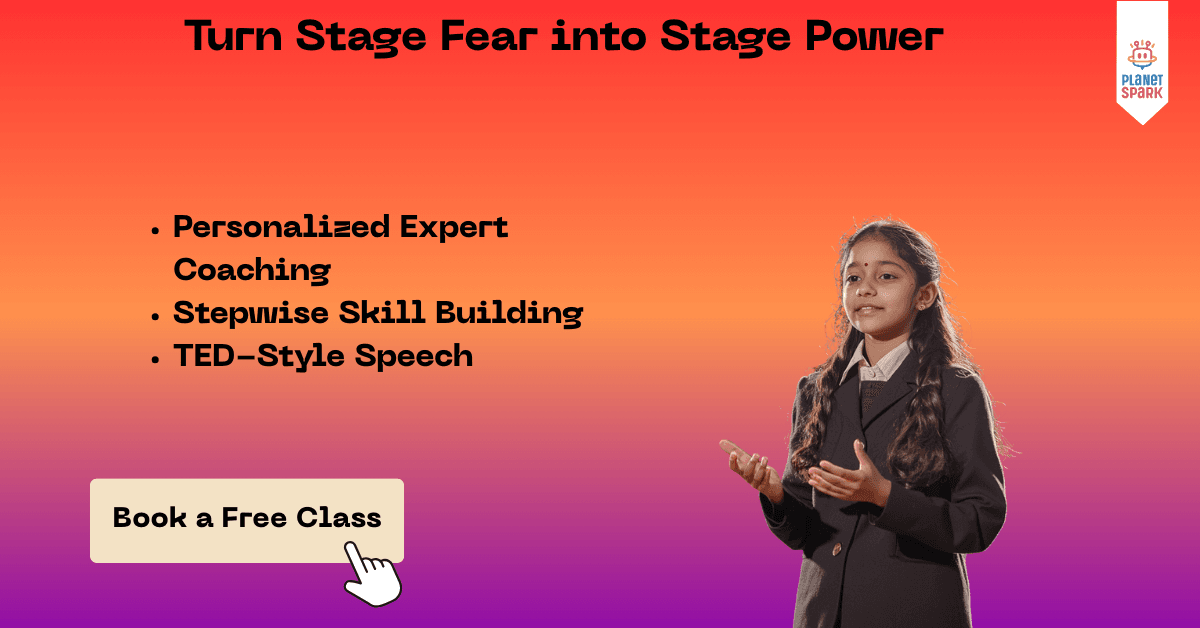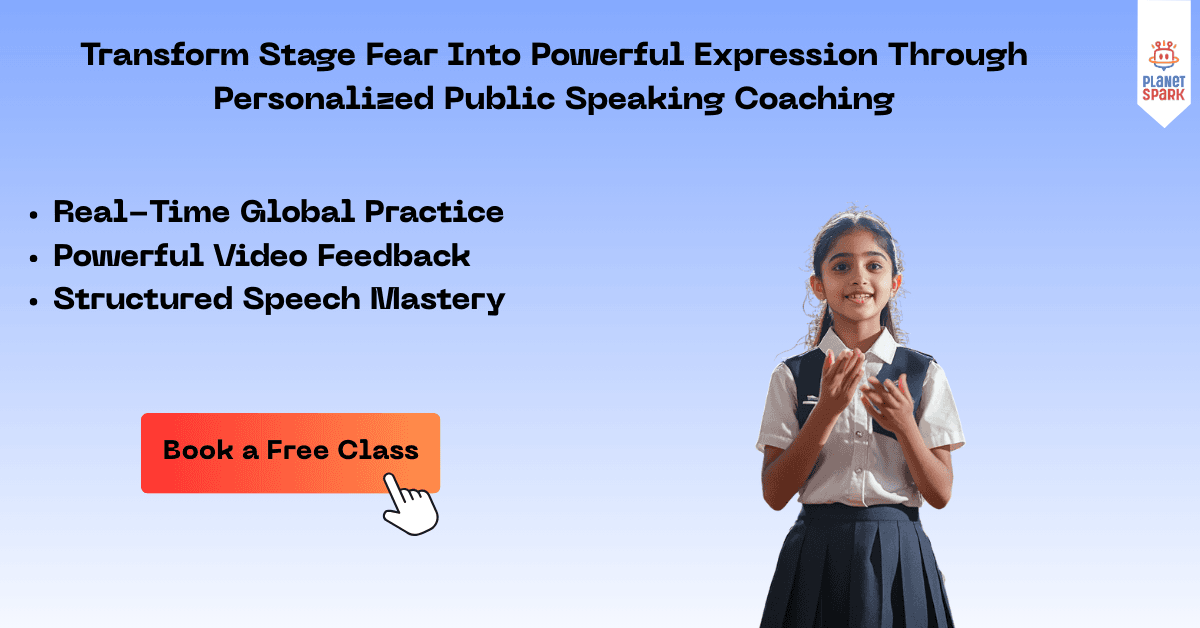Powerful Ways to Develop Confidence and Become Successful
Last Updated At: 10 Sep 2025
10 min read

Table of Contents
- Why Confidence Matters for Success
- 1. Understand Your Strengths and Weaknesses
- 2. Set Clear and Achievable Goals
- 3. Practice Positive Self-Talk and Develop a Growth Mindset
- 4. Step Out of Your Comfort Zone
- 5. Improve Communication Skills
- 6. Continuous Learning and Skill Development
- 7. Develop Healthy Habits
- 8. Learn to Handle Failures Gracefully
- 9. Surround Yourself With Positive Influences
- 10. Practice Gratitude and Mindfulness
- 11. Develop Emotional Intelligence and Resilience
- 12. Learn From Role Models and Mentors
- 13. Take Calculated Risks
- 14. Celebrate Achievements and Progress
- Your Path to Confidence and Success
- Master the Art of Public Speaking with PlanetSpark
- Frequently Asked Questions (FAQs)
Confidence is the key that unlocks potential. It shapes your decisions, your relationships, and your path to success. Many people believe success comes from talent alone, but in reality, self-confidence is often the difference between those who achieve their dreams and those who fall short. When you are confident, you embrace challenges, recover quickly from setbacks, and communicate effectively, all of which are essential ingredients for success.
In this comprehensive guide, we will explore powerful ways to develop confidence and become successful in life, offering actionable strategies, practical tips, and inspiring examples. By the end, you will have a roadmap for cultivating confidence and achieving your goals.

Why Confidence Matters for Success
Confidence is more than self-assurance, it is a foundation for action and growth. Without confidence, opportunities are often missed, and potential remains untapped. Here’s why building confidence is critical:
Decision-Making Power: Confident people trust their judgment, make decisive choices, and act without excessive self-doubt. For instance, a confident professional is more likely to pitch ideas at work or volunteer for leadership roles.
Better Relationships: Confidence allows for assertive communication. People are drawn to those who are self-assured, which can improve personal and professional relationships.
Career Growth: Employers and peers notice self-confidence as a sign of competence, leadership, and reliability.
Resilience: Life will throw challenges your way, but confidence equips you to face them, learn from failures, and keep moving forward.
Studies indicate that individuals with high self-confidence are more proactive, set ambitious goals, and are more likely to achieve them.
Boost Your Confidence Today!
1. Understand Your Strengths and Weaknesses
The journey to confidence begins with self-awareness. Knowing your strengths and weaknesses gives you clarity on where to focus your efforts and how to grow.
How to identify your strengths and weaknesses:
Self-Reflection: Take time to assess your achievements and areas where you struggled. Write them down.
Seek Feedback: Ask friends, family, or colleagues for honest opinions about your abilities.
SWOT Analysis: Map your Strengths, Weaknesses, Opportunities, and Threats.
Example: Jane, an aspiring entrepreneur, realized her strength was creative problem-solving, but her weakness was public speaking. By focusing on her strength for innovative projects and taking communication workshops, she gradually built confidence.
Actionable Tip: Revisit your self-assessment every month to monitor progress and adjust your goals.
2. Set Clear and Achievable Goals
Confidence grows when you know exactly what you want to achieve and how to get there. Goals provide direction and motivation.
Steps to effective goal-setting:
Be Specific: Instead of “I want to be successful,” define what success means to you, like “I want to launch a profitable online business in 12 months.”
Break it Down: Divide your goals into smaller, actionable tasks.
Set Deadlines: Timelines create urgency and structure, helping you stay accountable.
Track Progress: Regularly monitor achievements to boost motivation and confidence.
Example: Michael wanted to become a professional writer. He set a goal of writing 1,000 words per day and submitting one article per week to blogs. This structured approach built both skill and confidence.
Pro Tip: Celebrate small milestones to reinforce self-belief and maintain momentum.
3. Practice Positive Self-Talk and Develop a Growth Mindset
Your inner dialogue shapes your confidence. Negative thoughts like “I’m not good enough” can sabotage progress. Replace them with empowering statements:
“I am capable of learning new skills.”
“Challenges help me grow.”
“I can succeed with consistent effort.”
How to cultivate a growth mindset:
View failures as learning opportunities rather than setbacks.
Focus on effort and progress, not just results.
Surround yourself with people who encourage growth and positivity.
Example: Sara struggled with exams in college. Instead of giving up, she told herself, “I can improve with practice.” Over time, her grades improved, and her confidence soared.
Start Your Success Journey!
4. Step Out of Your Comfort Zone
Confidence develops when you challenge yourself. Growth does not happen in familiar territory.
Ways to push boundaries:
Take on new responsibilities at work or school.
Join clubs, organizations, or online communities.
Try public speaking or leading meetings.
Mini-Story: Raj feared networking events. He started by attending small gatherings and gradually spoke up in group discussions. Eventually, he led a presentation at a major conference, significantly boosting his confidence and career opportunities.
Tip: Begin with small, manageable steps to gradually expand your comfort zone.
5. Improve Communication Skills
Clear and confident communication is a hallmark of successful individuals. It ensures that your ideas are heard and respected.
Strategies to enhance communication:
Body Language: Stand tall, make eye contact, and maintain open posture.
Speech: Practice speaking clearly and concisely. Avoid filler words.
Listening: Engage actively and empathetically with others.
Example: Priya wanted a promotion but felt nervous talking to her boss. By practicing her points and using confident body language, she effectively communicated her achievements and won the promotion.
Tip: Record yourself speaking on a topic and review it to identify areas for improvement.

6. Continuous Learning and Skill Development
Knowledge breeds confidence. The more you know, the better prepared you are to face challenges and make decisions.
Ways to build expertise:
Read books, articles, and research papers in your field.
Take online courses or attend workshops.
Seek mentorship from experienced individuals.
Example: Alex, a young entrepreneur, consistently learned about marketing strategies. His knowledge allowed him to make informed decisions, confidently pitch ideas to investors, and grow his business.
Tip: Dedicate at least 30 minutes daily to learning something new. Over time, your expertise and self-assurance will increase significantly.
7. Develop Healthy Habits
Your physical and mental health directly affects confidence. A well-cared-for body and mind empower you to tackle challenges.
Key habits for confidence and success:
Exercise Regularly: Physical activity boosts endorphins, reduces stress, and enhances self-esteem.
Balanced Nutrition: A nutrient-rich diet fuels brain function and energy.
Adequate Sleep: Rested minds are more focused, productive, and resilient.
Mindfulness and Meditation: Reduce anxiety and cultivate mental clarity.
Example: Emma incorporated morning yoga and meditation into her routine. This increased her focus, reduced stress, and improved her overall confidence.
Unlock Your Potential!
8. Learn to Handle Failures Gracefully
Failure is inevitable, but confidence allows you to view setbacks as lessons rather than disasters.
Strategies to handle failure:
Analyze mistakes objectively to learn from them.
Avoid self-blame and negative self-talk.
Adjust strategies and try again.
Example: Thomas Edison faced thousands of failed attempts before inventing the lightbulb. Each failure taught him something new, and his resilience fueled ultimate success.
“Success is not final, failure is not fatal: It is the courage to continue that counts.” – Winston Churchill
9. Surround Yourself With Positive Influences
The company you keep has a strong impact on your confidence.
Tips:
Spend time with supportive friends, family, or mentors.
Avoid toxic individuals who undermine your self-esteem.
Join communities or groups of like-minded, motivated people.
Example: Aisha, an aspiring author, joined a writing group where members provided constructive feedback and encouragement. This support boosted her confidence and helped her publish her first book.
10. Practice Gratitude and Mindfulness
Gratitude shifts focus from what’s lacking to what’s achieved. Mindfulness keeps you present, reduces anxiety, and enhances confidence.
Ways to practice:
Keep a daily gratitude journal.
Meditate for 10–15 minutes daily.
Reflect on accomplishments regularly.
Example: By writing down three things she was proud of every day, Nina noticed an increase in her self-esteem and motivation to pursue goals.
Achieve Confidence and Success!
11. Develop Emotional Intelligence and Resilience
Emotional intelligence (EQ) helps manage emotions, navigate relationships, and maintain confidence under pressure.
Key aspects:
Recognize and regulate your emotions.
Develop empathy to strengthen relationships.
Build resilience to recover from setbacks.
Example: Mark, a manager, noticed conflicts in his team. Using EQ, he mediated effectively, improving team morale and showcasing his leadership abilities, which reinforced his confidence.
12. Learn From Role Models and Mentors
Observing successful people can accelerate your growth and boost confidence.
How to emulate role models:
Read biographies and interviews.
Watch videos or talks of industry leaders.
Identify habits, strategies, and mindsets to adopt.
Example: By following mentorship from an experienced entrepreneur, Lisa gained practical insights, avoided common pitfalls, and grew her startup confidently.
13. Take Calculated Risks
Success often requires stepping into the unknown. Confidence is built by assessing risks, taking action, and learning from outcomes.
Tips for calculated risk-taking:
Evaluate pros and cons carefully.
Start with smaller risks to build courage.
Reflect on outcomes to improve future decision-making.
Example: A small investor decided to diversify his portfolio after research. The initial success boosted his confidence, enabling him to take more strategic investment risks.
Step Into Your Best Self!
14. Celebrate Achievements and Progress
Acknowledging accomplishments reinforces confidence and encourages continuous growth.
Ways to celebrate progress:
Keep a success journal to track milestones.
Reward yourself for completing tasks or achieving goals.
Reflect on your journey and lessons learned.
Example: Every time Laura completed a writing project, she reviewed her progress and celebrated small wins. This kept her motivated and confident to tackle bigger projects.

Your Path to Confidence and Success
Building confidence and achieving success in life is a continuous journey. By focusing on self-awareness, goal-setting, continuous learning, resilience, and positive habits, you can cultivate the mindset and skills of successful individuals. Remember, confidence is not something you are born with, it is developed through consistent action, reflection, and growth.
“Believe in yourself and all that you are. Know that there is something inside you that is greater than any obstacle.” – Christian D. Larson
Master the Art of Public Speaking with PlanetSpark
Confidence shines brightest when you can express your ideas clearly. PlanetSpark’s Public Speaking Course is designed to help learners articulate their thoughts, overcome stage fear, and communicate with impact. Through interactive sessions, engaging activities, and personalized feedback, students gain the skills to speak confidently in any setting.
What You’ll Learn:
Techniques to overcome stage fright and nervousness
How to structure speeches and present ideas effectively
Voice modulation, body language, and non-verbal communication
Critical thinking and quick responses during Q&A sessions
Building confidence to speak in front of peers, teachers, or audiences
By practicing in a supportive environment, learners not only improve their communication skills but also boost overall self-confidence, which directly contributes to success in academics, career, and life.
Frequently Asked Questions (FAQs)
1. How can I develop confidence and become successful in life?
Focus on self-awareness, set clear goals, practice positive self-talk, step out of your comfort zone, and continuously learn.
2. What are some ways to boost self-confidence?
Build expertise, improve communication skills, exercise regularly, celebrate achievements, and surround yourself with supportive people.
3. Can habits of successful people help me build confidence?
Yes. Adopting habits like continuous learning, mindfulness, goal-setting, and resilience strengthens both confidence and success.
4. How does mindset affect my ability to be successful?
A growth mindset encourages learning from failure, taking risks, and believing in your abilities, critical for long-term success.
5. What strategies improve self-esteem and confidence?
Positive affirmations, journaling, setting achievable goals, seeking mentorship, and stepping outside your comfort zone are effective strategies.
6. How important is learning for confidence building?
Knowledge equips you to make informed decisions, face challenges confidently, and communicate effectively, key traits of successful individuals.
7. Can emotional intelligence impact success?
Yes. High EQ improves relationships, decision-making, resilience, and leadership skills, all of which contribute to personal and professional success.
Personalized Communication Report
Record a video to get a AI generated personalized communication report for your child
Select Learner's Class

Hi There, want to try these
tips for your child with
LIVE with our expert coach?
Let's check your child's
English fluency
